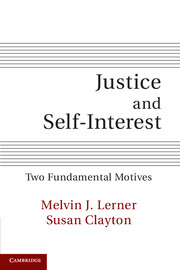Book contents
- Frontmatter
- Contents
- List of Figures and Tables
- Preface
- 1 Contesting the Primacy of Self-Interest
- 2 Why Does Justice Matter? The Development of a Personal Contract
- 3 Commitment to Justice: The Initial Primary Automatic Reaction
- 4 Explaining the Myth of Self-Interest
- 5 Defining the Justice Motive: Reintegrating Procedural and Distributive Justice
- 6 How People Assess Deservingness and Justice: The Role of Social Norms
- 7 Integrating Justice and Self-Interest: A Tentative Model
- 8 Maintaining the Commitment to Justice in a Complex World
- 9 Bringing It Closer to Home: Justice in Another “American Tragedy”
- 10 Emotional Aftereffects: Some Negative Consequences and Thoughts on How to Avoid Them
- References
- Author Index
- Subject Index
1 - Contesting the Primacy of Self-Interest
Published online by Cambridge University Press: 03 May 2011
- Frontmatter
- Contents
- List of Figures and Tables
- Preface
- 1 Contesting the Primacy of Self-Interest
- 2 Why Does Justice Matter? The Development of a Personal Contract
- 3 Commitment to Justice: The Initial Primary Automatic Reaction
- 4 Explaining the Myth of Self-Interest
- 5 Defining the Justice Motive: Reintegrating Procedural and Distributive Justice
- 6 How People Assess Deservingness and Justice: The Role of Social Norms
- 7 Integrating Justice and Self-Interest: A Tentative Model
- 8 Maintaining the Commitment to Justice in a Complex World
- 9 Bringing It Closer to Home: Justice in Another “American Tragedy”
- 10 Emotional Aftereffects: Some Negative Consequences and Thoughts on How to Avoid Them
- References
- Author Index
- Subject Index
Summary
For more than fifty years, prominent social psychologists have portrayed the pursuit of self-interest as the primary motivating force in people's lives. This perspective is common among the general public, in which it is often taken for granted that people will only do what they are paid or otherwise rewarded for doing. It also reigns among other academic disciplines, such as economics and evolutionary psychology. Although the former focuses on maximizing financial gain, and the latter on maximizing reproductive success, they both take individual self-interest as the fundamental driver of behavior. The primacy of self-interest is an implicit assumption that underlies much public discussion and policy.
Self-interest, however, falls short in explaining some common human behavior and emotional experiences – cases in which people appear to act against their own interest or to feel guilty when their acts promote their interests. Because we will spend the bulk of the book describing and explaining these cases, we start with some illustrative examples. We examine the postdecision consequences experienced by two remarkably different decision makers: corporate managers (Levinson, 1994; Smith, 1994) and caregivers of elderly parents (Brody, 1985; Brody, Dempsey and Pruchno, 1990). In both cases, decisions that negatively affect others, but that have adhered to all the requirements of rational self-interest, have been seen to result in serious emotional consequences for the decision makers. This regret, reluctance, and guilt, we argue, demonstrate the power of the justice motive.
- Type
- Chapter
- Information
- Justice and Self-InterestTwo Fundamental Motives, pp. 1 - 19Publisher: Cambridge University PressPrint publication year: 2011



